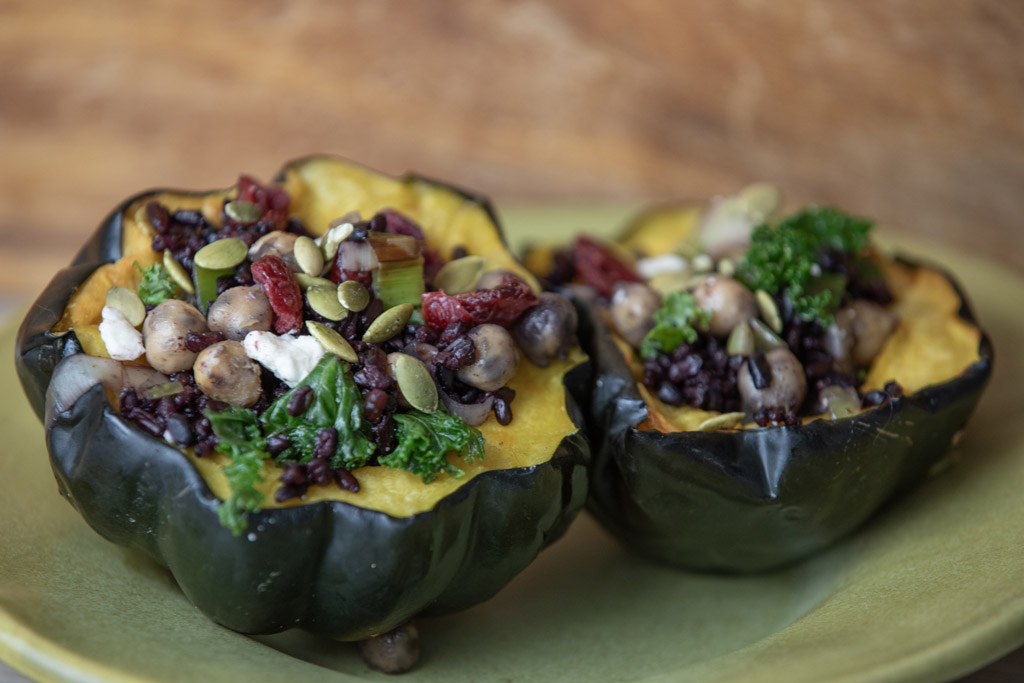As we feel the weather change here in South Carolina, there is a shift to the grounding and warming foods of winter. I am always inspired and excited to see all the varieties of squash and root vegetables.

Charlotte Hardwick relaxes at home with her King Charles Spaniel, Jude.
The mineral-rich vegetables inspire me to get busy in the kitchen after the freedom of summer and move toward the end of the year with clarity and purpose. If I am in town on the weekends, I will roast vegetables and make a quick soup, a pot of grain, and/or beans to build into meals.
These winter vegetables are here to nourish and keep us well during the colder months. Some of my favorites are butternut squash, beets, sweet potatoes, and carrots, and all the winter citrus.
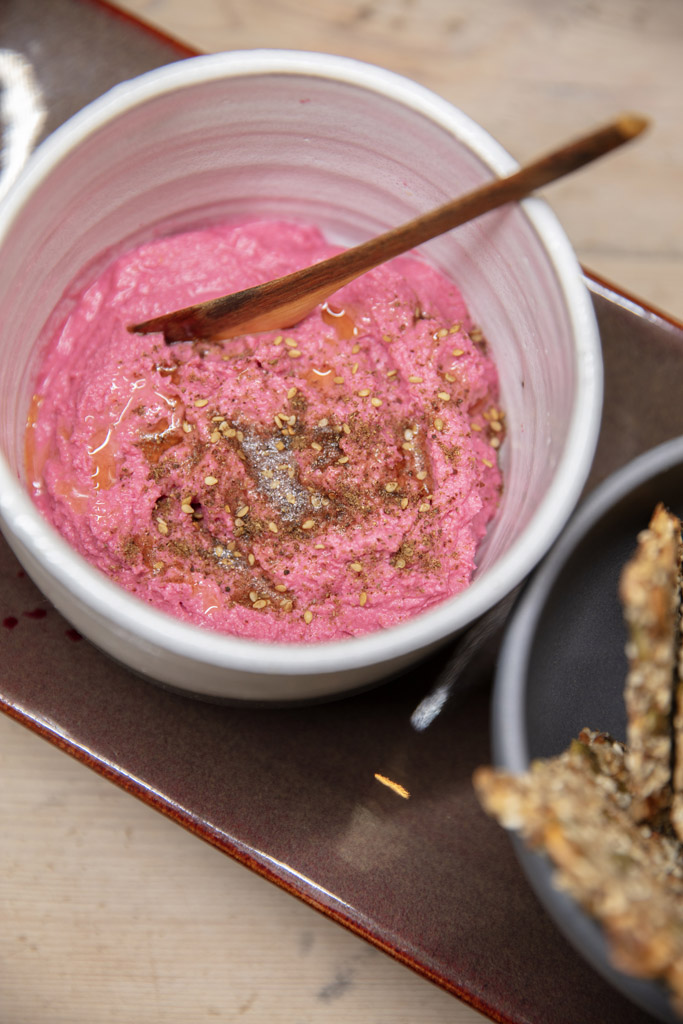
Beet Hummus
I often feel overwhelmed with the busy schedule that this season brings and the many exciting projects I want to begin. It is amazing to me to think about how, when we want to get more grounded, we look under the earth and to the beautiful vegetables that drink in the nutrients from the dark rich soil. They are packed with phytonutrients, antioxidants, fiber, complex carbohydrates–and the sweetness of these root vegetables can also satisfy a sweet tooth.
When I attended the Integrative Institute of Nutrition, I learned from Dr. John Douillard that following the same diet all year-round creates imbalances and cravings–seasons flow and change, and so should our diet. It makes sense to eat all kinds of foods and mix it up throughout the year with a seasonal, inspired variety to nourish us and bring us into balance. Nature gives us exactly what we need for that season and prepares our bodies for the next season.
Dr Douillard asked us, “What is this season doing to my body and how can I treat it with the food that nature provides?” A hot day calls for cooling foods and a cold day demands warming foods. It is so simple! I have seen a real shift in my own body, as well as those I work with.
We have so much information available to us, so many “experts” telling us what we should do that we all feel overwhelmed. With all the trends, products, and quick fixes around, tuning in and cooking for the season is a sustainable way to feel and stay well.
Winter is the time to nourish and strengthen the body through warm and hearty foods like animal protein or legumes, nuts, lots of warming spices, root vegetables, and iron-rich, dark leafy greens. Dark leafy greens, such as kale and collards, are rich in chlorophyll and help our bodies build immunity. Using a mineral-rich salt for winter cooking is also important because it helps to carry minerals to our tissues when it is cold. Nuts, seeds, and avocado nourish the nervous system and are great sources of healthy fat to keep our skin and tissues supple and healthy. Turmeric is one of the most powerful non-steroidal, anti-inflammatory herbs and I use it often in soups and warm drinks in the fall and winter. It repairs tissue, removes excess mucous, and reduces inflammation in the sinuses and respiratory tract.
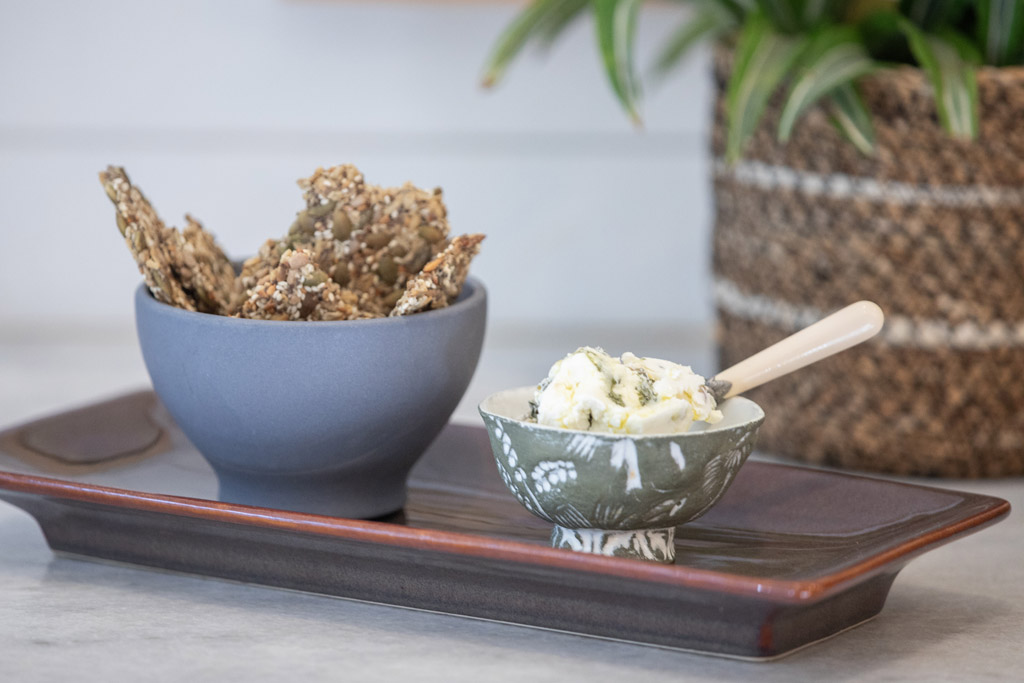
Protein Seed Crackers
If we dry out our bodies in the winter by depriving ourselves of necessary and restorative fats, we weaken our immune systems and are more susceptible to allergies in the spring. Mucus is a response to a cold, dry body and it is a breeding ground for bacteria, so think of eating to keep your insides warm and your tissues supple.
This is not the time for cold raw fruits and vegetables. I find that if I really enjoy those in spring and summer, I look forward to winter foods and how nurturing winter cooking and time around the table can be. With the shorter days and more darkness, Winter reminds us to rest, to slow down and do less.

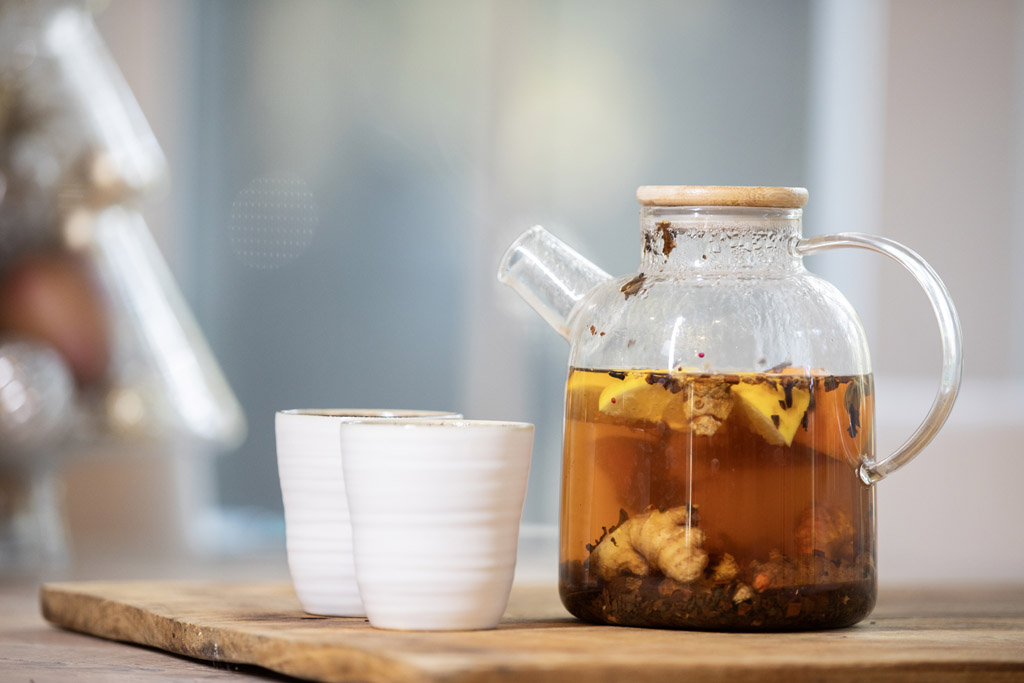 Warming Herbal Chai Warming Herbal Chai Tea
Warming Herbal Chai Warming Herbal Chai Tea
I don’t think many of my clients have thought of making a tea without an actual tea bag. I love to welcome my clients and friends with warm drinks, and this can simply mean adding spices and fresh herbs to hot water, steeping, and then straining into a mug. They are a beautiful way to stay healthy as the weather changes because they nourish the organs, glands, and tissues in the body.
These warm drinks will build the digestive fire and boost the immune system.
Combine any or all of these ingredients and pour hot water over. Let them steep, then enjoy.
Ginger, star anise, cardamon pods, cinnamon sticks, lemon peel, orange peel, whole black pepper, clove, fresh turmeric.
You can make several batches with the same ingredients just by adding more hot water. You can also add black or green tea to this.
About the tea
Fresh ginger contains gingerol, which reduces mucus and is a powerful anti-inflammatory. It will also help with nausea, headaches, pain, congestion, and infection. Cardamon has incredible anti-bacterial powers and a big anti-oxidant boost to build a strong immune system. Traditionally cardamon has been used as a digestive aid. Use cardamon pods, not powder, to strain easily.
Cinnamon is anti-viral, anti-bacterial, and anti-fungal. It is also excellent for regulating blood sugar, reducing sugar cravings, killing yeast in the gut, and reducing cholesterol. You can buy cinnamon sticks so they are easy to strain. Cloves contain eugenol to soothe sore throats and controls systemic inflammation. Turmeric is a powerful anti-inflammatory that boosts the immune system, soothes aches and pains, and improves focus. A pinch of pepper allows the body to soak up the turmeric easily. Star anise contains antioxidants that help the body protect against cellular damage from free radicals and toxins. Star anise is great for colds and weak digestion. Black pepper aids in digestion, warms the body, improves bile production, and aids metabolism.
Serves 4.
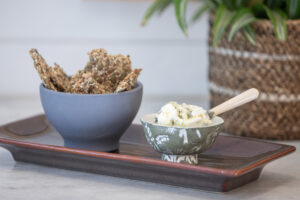
Protein Seed Crackers
Ingredients
1 cup oats
3/4 cup pumpkin seeds
1/3 cup raw sunflower seeds
1/3 cup sesame seeds
3 tablespoons chia seeds
3 tablespoons hemp or flax seeds
4 tablespoons avocado or olive oil
3/4 cup room temp water
Directions
Preheat oven to 375°.
Mix dry ingredients in a large bowl. Stir oil plus 3/4 cup water together and pour over dry ingredients. Mix to combine and roll in a ball. Transfer to a parchment lined baking sheet. Press a second piece of parchment paper over the top of mixture and roll out with a rolling pin or press with hands to flatten. The shape doesn’t matter but it will cover most of the cookie sheet.
Bake cracker until golden brown around edges, 15-20 minutes. Remove from oven and carefully turn out, parchment side up. Place a fresh sheet of parchment on baking sheet. Remove parchment from cracker, carefully turn cracker over, and return to baking sheet. Bake until firm and golden brown around edges, 15-20 minutes. Let cool on baking sheet, then break into pieces with your hands.
This is simply a template. As long as you keep measurements the same, you can substitute seeds, add nuts or experiment with your favorite spices.
Chia seeds are rich in fiber and protein. Flax seeds are one of the best sources of omega 3 fatty acids and are high in soluble fiber. Hemp seeds are a great source of plant protein, contain all 20 amino acids, are a rich source of omega 3 and 6, and contain gamma linoleic acid, which helps with inflammation. Pumpkin seeds are high in zinc, magnesium and healthy fats Sesame seeds are high in copper, magnesium, calcium, iron, and zinc. Sunflower seeds are a great source of E and B vitamins.
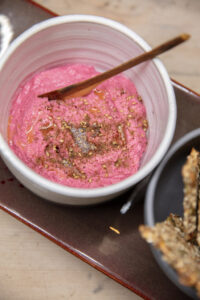
Beet Hummus
Ingredients
2 small roasted beets
1 15 ounce can of chickpeas
1 large lemon
2 cloves garlic
2 tablespoons tahini
1/4 cup olive oil
Directions
Any spice or herbs you like to add. I am using sumac and chives.
Roast the beets, let them cool, peel and blend. Then add remaining ingredients and blend until creamy. Adjust for spices, salt and pepper.
To roast beets: Remove the green tops and save to add to a salad or sauté. Rinse the beets and add to a baking dish with an inch or two of water. Cover with tinfoil. Bake at 375° for 30 minutes until soft. The time will depend on the size of the beets. Let them cool and the skin slips off easily.
You can also replace the beets with a roasted sweet potato.
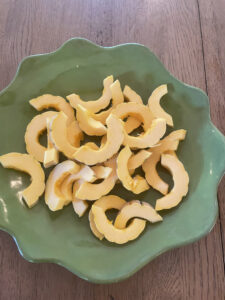
Delicata Squash Chips
Cut delicata squash in half. Scoop out seeds down the center. Place the two halves flat side down and slice into half-moon shapes. Toss in coconut oil to coat, sprinkle salt and roast at 375° until crisp. Timing will depend on how thick they are. I roast 30 minutes.

Creamy Cashew Butternut Squash Soup
In my fall classes, I love teaching different variations on butternut squash soup. I read about this one from Mikaela Reuben, an amazing chef I follow on Instagram, and changed it up a bit. It is so rich and creamy and I love how roasting the squash makes the soup taste different from how I normally start with sautéing the vegetables and then pureeing to make creamy.
Ingredients
2 tablespoons of coconut oil
3 cups of roasted butternut squash
1 diced red onion
3 tablespoons grated ginger
3 tablespoon curry powder or garam masala
1 cup crushed unsalted roasted cashews
2 cups water
1 can full fat coconut milk
chopped cilantro
juice of 1 lime juice
salt and pepper
Directions
Roast butternut squash at 375° for 45 minutes. The easiest way to do this is to cut the top of the squash off, then cut the squash in half and scoop the seeds out, then lightly coat squash with coconut oil.
While the squash is cooking, sauté the red onion in a bit of coconut oil and curry powder, then add grated ginger and roasted cashews. Turn off heat and scoop out the flesh of the cooled squash and add to the onion and spices on the stove. Sauté all together and add salt and pepper.
Once everything is well mixed, add water and cook over medium heat for 10 minutes. Then add lime juice and coconut milk. Cook on low heat for 15 minutes. Blend with an immersion blender and garnish with cilantro if you like.
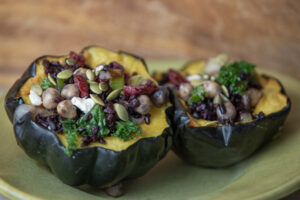
Stuffed Acorn Squash
This is a fall grain salad that you can prepare so many different ways for make ahead lunches.
Cut your favorite grain according to package directions and drain. I love farro because it is a nice base for hearty fall vegetables.
Saute 4 leeks, using white part only until translucent. (Save the green in the freezer for stock.) Add cooked leeks to your grain with a drizzle of olive oil and salt and pepper.
Add protein or vegetables of choice. Add greens or herbs. I added spinach.
Add nuts or seeds. I added walnuts Add your favorite cheese. I added feta.
Basic formula is sauté leeks or shallots for great flavor, plus cooked grain, protein, cooked or raw vegetables, nuts, seeds, greens, herbs, cheese.
You can omit or double any of these There are endless possibilities!
You can also just cook the grain and sauté leeks, then assemble different salads each day. If you want fewer carbs, you can sprinkle the grains over greens and keep it more green than grain.
Some ideas:
Black quinoa or wild rice with spinach, cherries, almonds, goat cheese
Brown rice with black beans, tomato, cilantro, pumpkin seeds, goat cheese
Barley with chicken, pecans, roasted sweet potato, spinach, blue cheese
Farro with white beans, arugula, chives, spinach, parmesan
Quinoa with chickpeas, squash, dried figs, radicchio
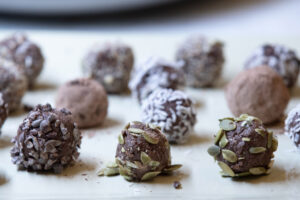
Raw Vegan Cacao Truffles
Makes 65 small truffles
Ingredients
2 cups raw almonds (or you can use almond meal)
1 cup unsweetened shredded coconut
12 dates
1 1/2 cup cacao powder
1 cup almond or coconut or oat milk
1/4 cup cacao nibs
1 teaspoon (or more) of orange zest
1 teaspoon vanilla
pinch of sea
Directions
Blend in a high-speed blender or food processor until smooth like cookie dough.
Refrigerate and roll into balls. I use a small melon ball scooper but you can use a spoon. Roll into cacao powder, crushed nuts, or shredded coconut, then refrigerate.
You can refrigerate for a week or freeze.
Cover and chill for 2 hours or until firm. Scatter the coconut, crushed nuts or cacao on a large plate. Scoop up approximately 1 tablespoon of the chocolate mixture and roll it into a smooth ball between your palms, then roll to coat.
Repeat with the remaining mixture, then place the truffles in an airtight container and chill thoroughly before serving.

